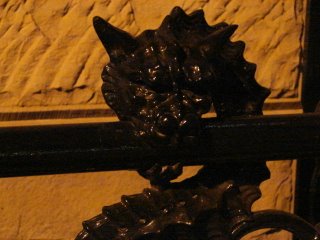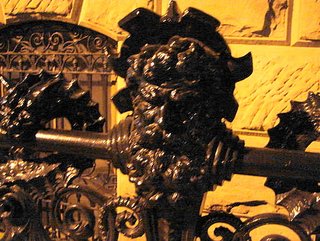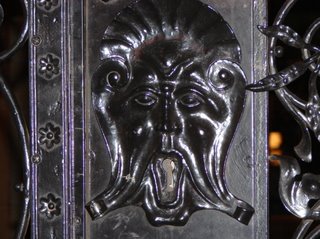Another one is the way someone goes about hailing a cab. A cab driver can separate the amateurs from the professionals at a glance. The novice may wave his hand at a taxi which has its roof light off (meaning the meter is on and there's already a passenger in the cab). You would never see a real New Yorker do that. Or he may hail while standing on the sidewalk, a faux pas for a New Yorker, who will always step out a few feet into the street (so he can be seen).
A few Fridays ago around midnight I was cruising along on LaGuardia Place in Greenwich Village in search of my next customer when I came to a red light at West 4th Street. Three cars were in front of me there, putting me a short distance from the intersection. After a few seconds of red-light waiting, I noticed a welcome sight down at the corner: two people were standing on the sidewalk, looking at me and waving their arms in the air - my next passengers. I knew they were tourists because, as noted, they were standing on the sidewalk, but who cares? A customer is a customer and, besides, I love tourists.
Now, aside from the sidewalk blunder, they were also making another mistake that is characteristic of the uninitiated - instead of walking to me, they were waiting at the corner for the light to change and for me to approach them. It was quite busy on the streets at this time, with not too many available cabs around, so standing there and waiting was a risky thing to do.
And they paid the price.
Suddenly, coming from behind, was a twenty-something guy without inhibition. Raising his arm into a hail, he walked right past the couple on the corner, approached my cab, and got in. He then called out to his friends, another guy and a girl, who followed. It didn't seem to me that they were aware of the others' intention to obtain my services but, even if they had been, it's not my role to intervene. I've found through experience that it's best to stay neutral in these affairs. And, really, a cab isn't truly "taken" until someone is literally sitting on the back seat.
So in they got and off we went, passing the poor inept couple on the corner of West 4th, who looked at us with bewildered expressions on their faces as we zipped by. I found the episode somewhat amusing and commented on it to my new passengers.
"Well," I said, "that's the difference right there between a New Yorker and a tourist," and I went on to give the young man a compliment on his expertise when it comes to getting taxis.
"How long have you lived here? Ten years?" I asked.
"Actually, I don't live here," he said, "I'm from Canada."
I was shocked.
"Are you kidding me?"
"No, I'm from Toronto."
"But you come to New York often, right?"
"No, this is my first time. Well, I was at the airport a couple of years ago, but that doesn't count." And then he added that "ayy?" that Canadians are known for saying at the end of their sentences.
"Wow," I said, "I don't think you know how good you are. You did that like a veteran New Yorker - you're a natural!"
Well, he and his friends loved that. Visitors to New York often feel a bit intimidated by the speed of particle flow here until they get used to it, so a compliment from an entrenched New Yorker like a taxi driver is a valued communication, indeed. The affinity level in the cab shot way up and they told me they were all college buddies and were here for the weekend to attend the wedding of another college buddy and tonight was a party night at the apartment of another college buddy who now lives in New York and that is where they were going, ayy?
Well, I thought this group was swell, and they seemed to think I was swell, too. It suddenly occurred to me that there was a way I could acknowledge their swellness, particularly the swellness of the fellow who'd hailed me, whose name I now knew was Hermie.
"Hermie," I said as we came to a stop at 4th Street and 2nd Avenue, "I'm going to make you an honorary New Yorker. Raise your right hand and repeat after me." Realizing he was in the presence of Authority, Hermie lifted his arm up in the air, as I did mine.
"I, Hermie..."
"I, Hermie..."
"Do hereby declare my love for, and loyalty to, the city of New York..."
"Do hereby declare my love for, and loyalty to, the city of New York..."
"I promise never to wait for a WALK/DON'T WALK sign to change..."
"I promise never to wait for a WALK/DON'T WALK sign to change..."
"I will always obey the first rule of getting a cab, which is I SAW IT FIRST IT'S MINE..."
"I will always obey the first rule of getting a cab, which is I SAW IT FIRST IT'S MINE..."
"I swear before my God that I will always turn off the damned television in the back of the taxi as soon as I sit down..."
"I swear before my God that I will always turn off the damned television in the back of the taxi as soon as I sit down..."
"I will eat a bagel every day..."
"I will eat a bagel every day..."
"with a schmear..."
"What's a schmear?" Hermie asked, not wanting to commit himself to something he didn't fully understand.
"It's cream cheese," I replied.
"With a schmear," said Hermie, continuing his vows.
"Unless it turns out you're lactose intolerant..." I added.
"Unless it turns out I'm lactose intolerant..."
"Or you really don't like cream cheese that much..."
"Or I really don't like cream cheese that much..."
"In which case, fa-gedda-bowt-it..."
"In which case, forget about it..."
"Fa-gedda-bowt-it..."
"Fa-gedda-bowt-it..."
"Very good. Now, Hermie, there's just one more thing - I'm going to spell out a word and I want you to pronounce it."
"Okay."
"C-O-F-F-E-E."
"Coffee."
"CAW-fee..."
"CAW-fee..."
"Again. CAW-fee..."
"CAW-fee!"
"Hermie, by the power invested in me by, uh, the Taxi and Limousine Commission, I hereby pronounce you to be an honorary New Yorker. Congratulations!"
A cheer went up in the cab that I believe was noticed by the passerby on the street. We continued on our way and by the time we arrived at their destination of 13th Street and 1st Avenue, the camaraderie had become so high among us that they actually invited me to go up to their party with them, a great honor. I had to decline, having a living to make, and they were fine with that, but then, as they were piling out, I realized I had one more thing to say.
"Hey, Hermie..."
He paused as he was halfway between the cab and the street and gave me his full attention.
"Yes?"
"The ayys have gotta go, okay?
"Yes, sir!"
And with that, Hermie and his friends were on their way.
I heaved a sigh.
It's always a pleasure to welcome a new one to the ranks.
********
And a pleasure, as well, to welcome you to click here for Pictures From A Taxi.




